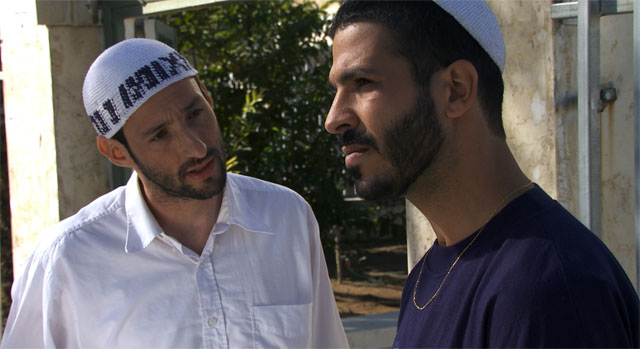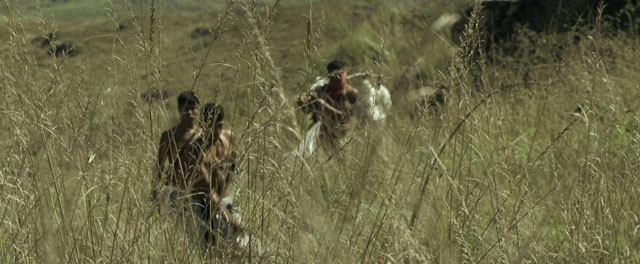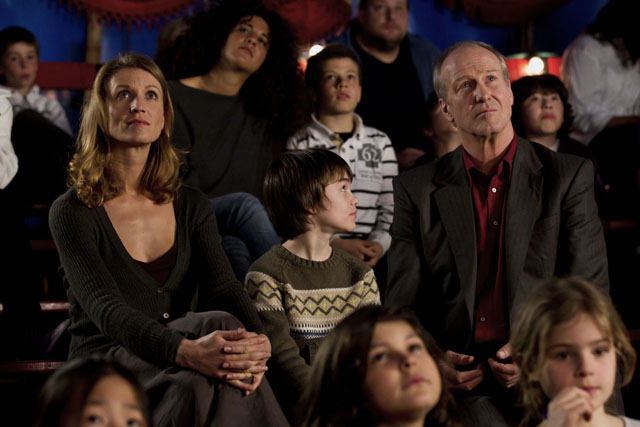Here’s where we’ll be gathering coverage of the coverage of film screening in Critics’ Week, which opened on Thursday, May 17 with Rufus Norris’s Broken and will close on Friday, May 25 with two medium-length films, Tsai Ming-liang’s Walker and João Pedro Rodrigues’s Morning of Saint Anthony’s Day.
So we begin, of course, with Broken, a “drama of dysfunction and pain, which too often looks strained, desperately self-conscious and replete with unconvincing and unearned emotional crises,” according to the Guardian‘s Peter Bradshaw. “The star is newcomer Eloise Laurence, playing an artless, intelligent and likable 11-year-old girl called Skunk. She is the movie’s real find, a natural screen performer. Skunk is the daughter of Archie (Tim Roth), whose wife has left him. He is developing feelings for his child minder, Kasia (Zana Marjanovic), whose boyfriend Mike (Cillian Murphy) is one of Skunk’s teachers. They live in a suburban close which is turning into an emotional minefield because of the resident problem family. Mr. Oswald (Rory Kinnear), unhinged after the death of his wife, has become unable to control his young daughters and prone to acts of bullying and violence, directed at neighbor Rick (Robert Emms), a young man with learning difficulties.”
Broken is “graced by a lovely score from Britpop eminence Damon Albarn’s Electric Wave Bureau outfit,” notes David Rooney in the Hollywood Reporter, but: “Given how incisively screenwriter Mark O’Rowe adapted Jonathan Trigell’s book for the trenchant 2007 drama Boy A, it’s disappointing that he has not managed to do the same for Daniel Clay’s novel. The fault may also lie with a novice director unwilling to make hard choices in the editing room. But there are simply too many characters jostling for attention and too many competing plot strands in a not-quite-seamless marriage of hard-edged social realism with a lyrical novelistic overlay. That said, the film is rich in poignant moments and negotiates its frequent shifts from violence to gentleness to sorrow with sensitivity.”
More from Kevin Jagernauth (Playlist, D), Fabien Lemercier (Cineuropa) and Demetrios Matheou (Arts Desk).
“As forceful as a kick in the jaw, God’s Neighbors reps a sharp rebuke of bigotry and male aggression perpetrated under the banner of religious orthodoxy,” writes Maggie Lee in Variety. “Israeli writer-helmer Meni Yaesh borrows savvily from genre conventions to portray a young man’s attempts to break away from a gang of religious extremists who terrorize their suburban neighborhood.”
“A trio of twentyish skull-capped guys, Avi, Kobi and Yaniv, have taken it upon themselves to police their Bat Yam neighborhood for transgressions against the letter of religious laws,” writes Todd McCarthy in the Hollywood Reporter. “Handy with baseball bats and their fists, they’re particularly hot to go after Arabs who have the effrontery to play loud music and otherwise disrupt the Sabbath, but they’re also rough on more relaxed Jews who keep their stores open too late on Friday nights, don’t dress right and so on (the film’s Hebrew title can best be translated as The Supervisors or The Monitors)…. Director Yaesh freely admits he grew up loving Van Damme and Chuck Norris action movies and there’s more than a trace of this visible in his in-your-face style.”
Update, 5/23: “As the film moves into its increasingly thriller-like final stages, the comedy banter between Avi and pals sits more and more awkwardly, and Yaesh strains awkwardly for hard-edged streetwise immediacy,” writes Jonathan Romney in Screen. “The director-writer not surprisingly lists GoodFellas among his influences, and the theme of interracial confrontation (brought to the fore when the friends head for a rumble with an Arab gang) brings hints of Do the Right Thing or La Haine.” More from Cineuropa.
“Ticking off a laundry list of French art film prerequisites—Seductive novelist, check! Gorgeous mistress, check! A dying patriarch, a country house and an inheritance, check!—while bringing nothing really new to the table, In a Rush (Au galop) reps a rather generic directorial debut for Gallic actor Louis-Do de Lencquesaing (The Father of My Children, Polisse).” In the Hollywood Reporter, Jordan Mintzer does note that the film features “strong performances—especially from the filmmaker’s daughter, Alice (Summer Hours)—yet very little in terms of creativity and cinematic prowess.”
In Variety, Boyd van Hoeij adds that the film is “what the French call ‘romanesque’—suggesting a narrative reminiscent of literary fiction, often about love—but most other languages would probably favor an equivalent of ‘dull’ or ‘uninvolving.'” More from Fabien Lemercier (Cineuropa) and Jonathan Romney (Screen).
The Savages represents “a certain brand of Argentine movie-making defined by a narrative minimalism, whose chief but by no means only proponent is Lisandro Alonso, and which leaves the audience with a great deal to do,” writes Demetrios Matheou at the Arts Desk. “Directed by Alejandro Fadel, it observes a group of teenage miscreants as they break out of a juvenile detention center and escape into the surrounding wilderness…. There is barely any dialogue, while motivations and plot developments are often vague. Yet the images are sumptuous, and the brooding, malevolent tone absorbing.”
“When you ask David Lambert about the intention behind his first film,” writes Domenico Laporta at Cineuropa, “the Belgian filmmaker simply replies that he wanted to remake The Umbrellas of Cherbourg, telling the tale of the disenchanted reunion of two lovers, who were passionately in love before a terrible event separated them. The screenplay of Beyond the Walls follows these three phases—love, absence, reunion—in the lives of Paulo and Ilir, respectively played by Matila Malliarakis and a rising star in French cinema, the excellent Guillaume Gouix (Jimmy Rivière, Nobody Else But You) whose phosphorescent charisma persists on screen even after the projector has been turned off.”
Updates, 5/23: Allan Hunter for Screen: “Lambert’s greatest talent may lie in creating characters that we care about and developing a film that brings a few fresh twists to an old familiar tale of whether love can conquer every obstacle in its path. On that basis, Beyond the Walls fulfills the promise of his previous work as a screenwriter and short filmmaker.”
Ryan Lattanzio at the Evening Class: “Hopefully there is more to come from Lambert, because Hors Les Murs, despite being a conventional love story, breaks new ground for gay film.”
Neil Young in the Hollywood Reporter: “A Dangerous Method meets The Elephant Man in writer-director Alice Winocour’s absorbingly luminous debut feature Augustine, which examines the unusual relationship between a pioneering 19th-century neurologist and his ‘star’ teenage patient. The presence of top-billed Vincent Lindon (Anything For Her) and the renown of his real-life character Professor Charcot will aid the picture’s September bow in France—though the main talking-point will be the break-out performance of mono-monikered singer-turned-actress ‘Soko’ in the demanding title-role.” She “compellingly underplays an individual awkwardly caught between girlhood and womanhood by her physical traumas. She certainly confirms the promise that saw her nominated as ‘Best Female Hope’ at the 2006 Césars (for Xavier Giannoli’s In the Beginning), holding her own against the avuncular, ever-observant slyness of the vastly more experienced Lindon, himself a four-time César nominee.”
Update: “Charcot’s study of hysteria, which directly influenced Freud’s theory of the unconscious, has long been of interest to medical historians, sociologists and feminists,” writes Leslie Felperin in Variety, “and Winocour’s script lightly evokes this background without resorting to lectures about patriarchy or the medicalization of madness. Direct-to-camera interviews with real-life femme psychiatric patients, telling their own stories but dressed in 1870s garb, are interspersed at intervals, a highly effective means of connecting the dots between mental illness and gender. Admirably willing to leave much unsaid and let eyes and gestures do the talking, Winocour draws out the intense intimacy and seesawing balance of power and desire between Augustine and Charcot, which will invoke comparisons, probably in Augustine‘s favor, with David Cronenberg’s similarly themed A Dangerous Method.”
Updates, 5/23: “In Sofia’s Last Ambulance, Doctor Yordanov, nurse Mila and driver Plamen are in charge of one of only 13 ambulances that serve a city with a population of 1.2 million,” writes Vladan Petkovic at Cineuropa. “They have to fight the crumbling health-care system, drunk and drugged patients and their panicked family members, careless drivers and potholes that seem to riddle all the streets of the bustling city of Sofia.” This “is as pure and as uncompromising as a documentary film gets.”
Update, 5/29: “On one level, Metev’s movie is a study of workplace relations and how folk get along in cramped spaces and extreme conditions,” writes Neil Young in the Hollywood Reporter. “But it also provides indirect commentary on the state of the nation—as illustrated by various districts in the city-center and the run-down surrounding areas—painting as unflattering a portrait as Cristi Puiu‘s fictional variant The Death of Mr. Lazarescu did of Bulgaria’s Balkan neighbor Romania.”
Deborah Young in the Hollywood Reporter: “Confused, at times naive story-telling eventually gives way to a powerful dramatic finale, but one so downbeat it leaves a bitter taste in the mouth, in Peddlers, a first feature by Indian writer-director Vasan Bala. The rest of the tale leisurely circles around two destitute 20-year-olds who fall into Mumbai’s drug trade and a young cop who stalks them; all three carry scars from their childhood that supposedly, but not very convincingly, motivate their execrable behavior. Though it takes a long time coming together, the Hindi-language film does finally succeed in its action-packed last half-hour.” More from Jay Weissberg in Variety.
“A tale of inconsolable grief sensitively told from a bizarre angle, Maddened by His Absence (J’enrage de son absence) is carried beautifully by a downright haunted William Hurt,” writes Lisa Nesselson in Screen. “If ever a character fit the description ‘There’s method in his madness,’ Hurt’s Franco-American Jacques, who returns from Boston to Paris to settle several layers of family business, is it. Co-writer/director Sandrine Bonnaire whose 2007 doc about her developmentally-challenged sister Her Name Is Sabine enjoyed deserved attention, makes the transition to fiction by drawing viewers in to a story as wrenching as it is layered.”
But in the Hollywood Reporter, Jordan Mintzer finds Maddened to be “emotionally overcharged” and “heavy-handed… Making his first excursion to France since Chantal Akerman’s A Couch in New York, Hurt fares extremely with dialogue predominantly en français, offering the rare occasion of an American actor who can hold his own in a French movie. However, his verbal dexterity is often at odds with the film’s onslaught of grandiose emotions, which Bonnaire dishes out via countless close-ups and a soundtrack of heavy-duty orchestral compositions from Arvo Part and Henryk Gorecki.” More from Bénédicte Prot (Cineuropa) and Boyd van Hoeij (Variety).
“Aquí y Allá is a calm, plaintive film about working-class life in Guerrero, Mexico,” writes Ryan Lattanzio at the Evening Class. “There is no big drama in Aquí y Allá, not a voice raised, nor even a tinge of hysteria. The people in [Antonio Méndez Esparza’s] film understand the smallness of their existence and despite having little money and modest dwellings, they seem grateful just to be alive. Esparaza imposes no agenda on his film. He simply wants us to encounter people in a place we have not seen, and his cast is comprised of non-professional actors whose restrained performances provide the film’s naturalist underpin.”
Update, 5/24: And this year’s award-winners are… The Nespresso Grand Prize for La Semaine de la Critique goes to Aquí y Allá.
The France 4 Visionary Award: Sofia’s Last Ambulance.
The Prix SACD (Society of Authors, Directors and Composers): God’s Neighbors.
ACID/CCAS Distribution Support: The Savages.
In the short films categories, the Canal+ Award goes to Shin Suwon’s Circle Line, the Nikon Discovery Award to Damien Manivel’s A Sunday Morning and a Special Mention to Juliana Rojas’s Doppelgänger.
Cannes 2012 Index: a guide to the coverage of the coverage. For news and tips throughout the day every day, follow @KeyframeDaily on Twitter and/or the RSS feed.







